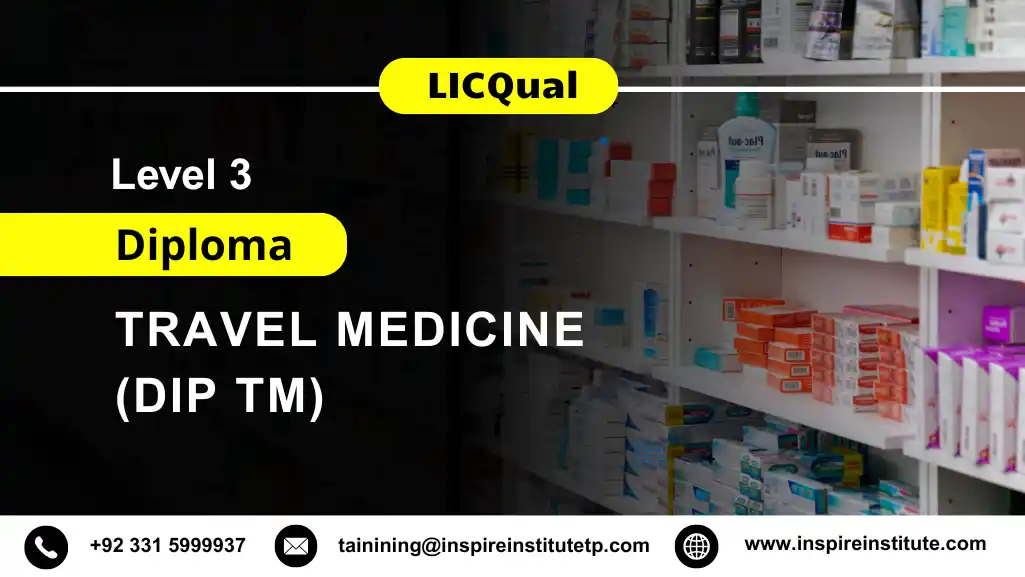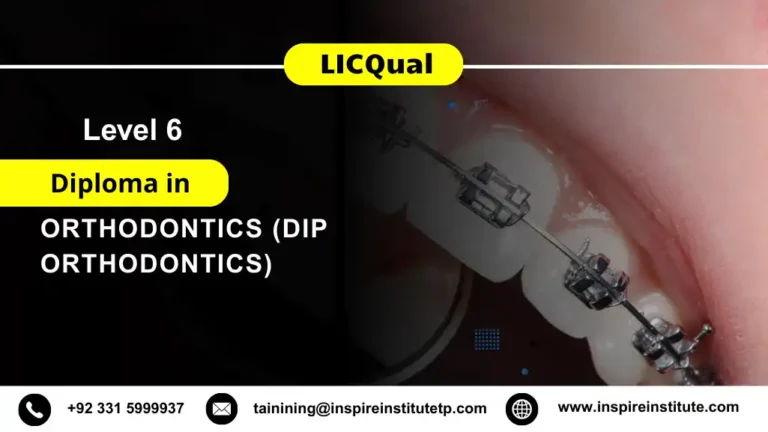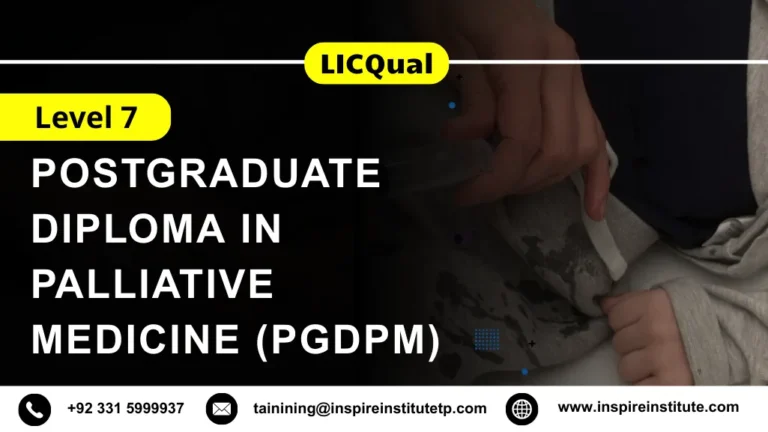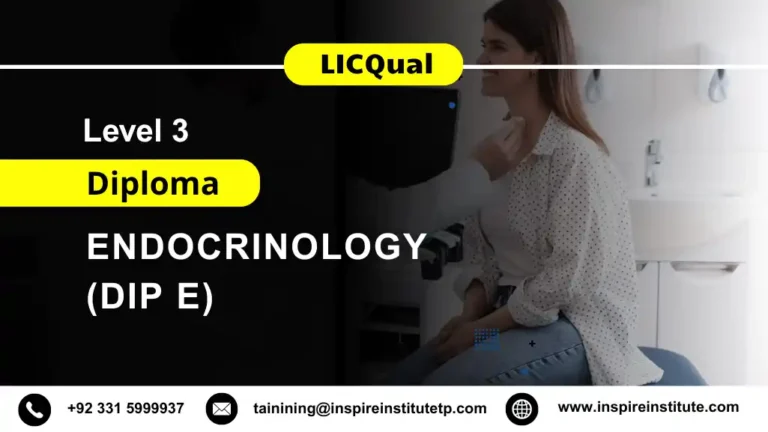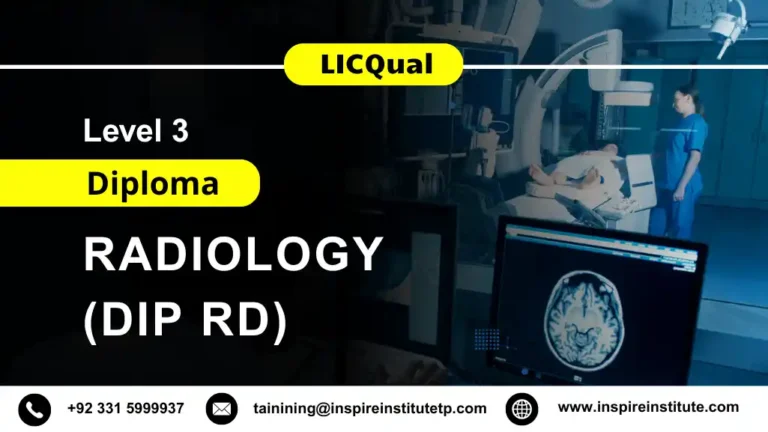LICQual Level 3 Diploma in Travel Medicine (Dip TM)
The LICQual Level 3 Diploma in Travel Medicine (Dip TM) is a UK-accredited qualification designed for healthcare professionals, nurses, medical assistants, and individuals aiming to specialise in travel health and preventive care. In today’s globalised world, international travel has increased the risk of exposure to infectious diseases, environmental hazards, and other travel-related health challenges. This assignment-based programme equips learners with the knowledge and practical expertise to assess health risks, provide preventive guidance, and manage travel-related medical issues effectively, ensuring safe and informed travel for individuals and communities.
Learners gain comprehensive knowledge of travel medicine, including an understanding of infectious diseases, tropical illnesses, immunisation protocols, and environmental and occupational health risks associated with travel. The course emphasises evidence-based strategies for disease prevention, vaccination planning, and global health regulations, ensuring that graduates are prepared to deliver informed and accurate medical advice in diverse healthcare settings.
The programme also focuses on practical applications, allowing learners to develop essential clinical skills in pre-travel consultations, patient risk assessment, immunisation administration, and management of travel-related medical emergencies. By combining theoretical knowledge with hands-on practice, graduates are equipped to provide patient-centred care in hospitals, clinics, occupational health departments, and community health initiatives.
As a UK-accredited qualification, the diploma not only validates advanced knowledge in travel medicine but also carries international recognition, enhancing career prospects. Graduates can pursue roles in travel health clinics, hospitals, public health organisations, and global health agencies, reflecting the professional credibility and practical value of the course worldwide.
The assignment-based learning structure offers flexibility for busy professionals, enabling learners to balance personal and professional commitments while progressing academically. This self-paced approach is particularly beneficial for nurses, healthcare practitioners, and public health specialists who wish to expand their expertise in travel medicine without compromising work responsibilities.
The curriculum integrates the latest research, clinical guidelines, and global best practices in travel medicine, ensuring graduates can implement safe, effective, and ethical care. By focusing on evidence-based training, learners are prepared to offer high-quality interventions, including health education, immunisation planning, and preventive strategies tailored to travellers’ needs.
Completing the LICQual Level 3 Diploma in Travel Medicine (Dip TM) empowers learners with the knowledge, practical skills, and UK-recognised qualification needed to advance their careers. Graduates are well-prepared to contribute to global health initiatives, enhance patient safety during travel, and provide professional, evidence-based care to travellers across diverse healthcare and community settings.
Why Choose this Qualification
The LICQual Level 3 Diploma in Travel Medicine (Dip TM) offers learners a unique opportunity to gain specialised knowledge and practical skills in travel health, preventive care, and global disease management. In an increasingly interconnected world, the demand for healthcare professionals skilled in travel medicine is rising. This UK-accredited, assignment-based programme equips learners to provide safe, evidence-based medical advice, risk assessment, and preventive care for travellers, ensuring high professional competence and enhanced career prospects.
Key Reasons to Choose this Qualification
Specialist Knowledge
- Gain an in-depth understanding of infectious diseases, tropical medicine, and travel-related health risks.
- Learn about vaccination protocols, immunisation planning, and global health regulations.
- Understand the impact of environmental, occupational, and lifestyle factors on travel health.
- Develop the ability to assess and manage health risks associated with international travel.
- Apply evidence-based medical knowledge to diverse travel healthcare scenarios.
Practical Application
- Acquire skills in pre-travel consultations, patient risk assessment, and preventive planning.
- Develop competence in immunisation administration and monitoring traveller health.
- Learn to manage travel-related medical emergencies and minor illnesses.
- Gain experience in providing patient-centred advice tailored to individual traveller needs.
- Apply theoretical knowledge effectively in clinics, hospitals, and community health programmes.
Recognised Qualification
- Earn a UK-recognised diploma validating advanced knowledge in travel medicine.
- Enhance professional credibility and international employability.
- Gain a qualification respected by travel clinics, hospitals, and public health organisations.
- Meet global healthcare standards for preventive and travel-related medical care.
- Open opportunities for further advanced studies or specialised training in global health.
Flexible Learning Pathway
- Complete the programme at your own pace through an assignment-based format.
- Balance professional, personal, and academic commitments effectively.
- Suitable for healthcare practitioners, nurses, and public health professionals.
- Structured online learning with practical applications ensures comprehensive skill development.
- Flexibility encourages continuous learning without compromising career responsibilities.
Evidence-Based Training
- Engage with the latest research, guidelines, and best practices in travel medicine.
- Develop decision-making skills using evidence-based interventions and preventive strategies.
- Understand global disease epidemiology, emerging health threats, and vaccination updates.
- Learn to design safe, effective travel health plans for diverse populations.
- Apply scientifically validated practices to improve patient outcomes and traveller safety.
Career Development
- Access roles in hospitals, travel health clinics, public health departments, and global health agencies.
- Develop specialised expertise that enhances professional growth and career progression.
- Prepare for roles such as travel health consultant, immunisation officer, or community health advisor.
- Build a strong foundation for further studies in infectious diseases or public health.
- Enhance employability across international and community-based healthcare settings.
Enhanced Patient Care Delivery
- Develop skills to provide comprehensive, patient-centred travel healthcare.
- Learn to assess, educate, and manage the health of travellers effectively.
- Improve patient safety through evidence-based advice and preventive strategies.
- Support travellers in managing chronic conditions while abroad.
- Contribute to public health initiatives by reducing travel-associated health risks.
Professional Growth
- Strengthen clinical reasoning, communication, and problem-solving skills.
- Cultivate professionalism, ethical awareness, and accountability in healthcare delivery.
- Develop teamwork and collaboration skills for multidisciplinary healthcare environments.
- Build confidence in delivering specialised travel medicine consultations.
- Foster lifelong learning and continued professional development in global health.
The LICQual Level 3 Diploma in Travel Medicine (Dip TM) provides learners with a robust foundation in travel health and preventive medicine. By combining specialist knowledge, practical skills, and UK-recognised accreditation, graduates are equipped to advance their careers, deliver exceptional patient care, and contribute meaningfully to global travel health initiatives.to global health outcomes in endocrinology.
Course Overview
LICQual UK Awarding Body
Average Completion Time:
4-12 Months
Study Units: 6 Units
Evidence & Assignment Based
Mandatory Units
Who Should Take This Course
The LICQual Level 3 Diploma in Travel Medicine (Dip TM) is ideal for healthcare professionals, nurses, medical assistants, and individuals looking to specialise in travel health, preventive care, and global disease management. This assignment-based programme equips learners with the theoretical knowledge and practical skills to assess, manage, and advise travellers on health risks effectively. Designed for flexible learning, it supports career advancement while meeting professional standards in travel medicine and global healthcare.
This course is suitable for
Healthcare Professionals
- Nurses, doctors, and allied health professionals seeking specialised skills in travel medicine.
- Practitioners looking to integrate preventive care strategies into their clinical practice.
- Professionals aiming to manage travel-related infectious diseases, vaccinations, and health risks.
- Those wanting to enhance patient consultation skills for international travellers.
- Healthcare workers seeking evidence-based, UK-recognised accreditation to boost credibility.
Public Health Practitioners
- Individuals involved in community health initiatives or global health programmes.
- Professionals tasked with disease prevention, immunisation planning, and outbreak management.
- Public health officers aiming to strengthen skills in travel risk assessment.
- Practitioners seeking to apply epidemiological data to traveller health guidance.
- Professionals desiring enhanced knowledge in international travel health protocols.
Nurses and Clinical Staff
- Nurses working in travel clinics, hospitals, or primary care settings.
- Clinical staff responsible for patient education, vaccination, and health monitoring.
- Individuals aiming to implement preventive care plans for travellers.
- Professionals seeking competency in managing travel-related emergencies and health risks.
- Healthcare staff desiring flexible, assignment-based learning for career growth.
Medical Students and Graduates
- Recent graduates looking to specialise in travel medicine and global health.
- Students seeking practical experience in risk assessment, vaccination, and patient counselling.
- Individuals wishing to gain a UK-recognised diploma to enhance employability.
- Learners aiming to develop knowledge in infectious disease prevention and management.
- Graduates aspiring to work in international healthcare, NGOs, or travel health services.
Travel Clinic Staff
- Professionals providing travel consultations and vaccination services.
- Staff seeking updated knowledge of global disease outbreaks and preventive strategies.
- Individuals aiming to deliver patient-centred care for diverse traveller populations.
- Professionals responsible for health advice for business, tourism, and expatriate travel.
- Staff wanting practical skills to manage minor travel-related illnesses and emergencies.
International Healthcare Workers
- Professionals working with expatriates, migrants, or international communities.
- Individuals seeking expertise in tropical diseases and cross-border health risks.
- Healthcare workers aiming to implement evidence-based travel health interventions.
- Staff needing competency in global vaccination guidelines and safety protocols.
- Professionals wanting to advance careers in international health organisations.
Career Changers
- Individuals from allied health backgrounds seeking to specialise in travel medicine.
- Professionals looking to shift focus into preventive care and global health.
- Those aiming to gain practical, assignment-based experience in travel healthcare.
- Learners seeking flexible training to balance professional and personal responsibilities.
- Individuals desiring a UK-recognised qualification to open new career opportunities.
Research and Academic Practitioners
- Academics interested in global health, infectious disease, or preventive medicine.
- Researchers conducting studies on travel-related illnesses and interventions.
- Professionals seeking applied knowledge to inform policy or educational programmes.
- Those aiming to integrate practical travel medicine competencies into teaching.
- Individuals seeking internationally recognised credentials for academic credibility.
The LICQual Level 3 Diploma in Travel Medicine (Dip TM) is designed for a wide range of learners in healthcare, public health, and global health sectors. By providing evidence-based knowledge, practical skills, and a UK-recognised qualification, this programme equips learners to excel professionally, advance their careers, and contribute meaningfully to global traveller safety and preventive healthcare.fessional credibility, and contribute to improved patient outcomes in endocrinology and metabolic medicine.
Course Benefits
The LICQual Level 3 Diploma in Travel Medicine (Dip TM) offers extensive benefits for learners aiming to build specialised expertise in travel health, disease prevention, and international healthcare management. By integrating strong theoretical foundations with evidence-based practical applications, this UK-accredited qualification equips learners to assess, manage, and advise travellers effectively on health risks, vaccinations, and preventive care. Designed as an assignment-based programme, it provides flexibility, academic excellence, and clinical relevance, supporting professional development for healthcare practitioners, nurses, travel health advisors, and aspiring specialists in travel medicine.
Key Benefits of the Course:
- Specialist Knowledge:
Gain a comprehensive understanding of travel-related illnesses, tropical diseases, immunisation protocols, and global health risks. Learners explore preventive strategies, vaccination schedules, travel-related pharmacology, and the management of travellers with pre-existing conditions. This knowledge enables graduates to make informed, evidence-based decisions and provide high-quality travel health advice. - Practical Application:
Develop essential clinical skills in patient assessment, risk evaluation, and preventive care planning. Learners gain practical competence in administering vaccinations, providing health advice for various destinations, monitoring travel-related conditions, and supporting travellers with chronic illnesses. The course ensures graduates can effectively apply their expertise in clinics, travel health centres, and community healthcare settings. - Recognised Qualification:
Earn a UK-recognised diploma validating advanced knowledge and practical skills in travel medicine. This internationally recognised qualification enhances professional credibility and career prospects, aligning with global healthcare standards. Graduates can pursue employment in hospitals, travel clinics, international health organisations, and research facilities worldwide. - Flexible Learning Pathway:
Delivered through an assignment-based format, the programme allows learners to balance professional or personal responsibilities while advancing academically. This flexibility suits nurses, healthcare assistants, public health professionals, and career changers seeking structured yet accessible training in travel medicine and preventive healthcare. - Evidence-Based Training:
The course integrates current research, clinical guidelines, and best practices in travel medicine. Learners engage with evidence-based approaches to disease prevention, vaccination strategies, traveller education, and emergency preparedness, ensuring graduates adopt safe, effective, and ethical healthcare practices. - Career Development:
This qualification opens diverse career opportunities in travel health clinics, hospitals, public health agencies, and international health organisations. Graduates can pursue roles such as travel health advisor, vaccination specialist, global health coordinator, or advance to further studies in tropical medicine, public health, or clinical research. - Enhanced Patient Care Delivery:
Learners develop expertise to provide patient-centred travel healthcare, including personalised advice, vaccination planning, and monitoring of travel-related conditions. Graduates are equipped to improve traveller safety, prevent disease outbreaks, and contribute to global public health initiatives. - Professional Growth:
The programme strengthens clinical reasoning, communication, and teamwork skills essential for healthcare delivery in travel medicine. Learners cultivate professionalism, ethical awareness, and critical thinking, preparing them to become confident, competent, and compassionate travel health practitioners.
The LICQual Level 3 Diploma in Travel Medicine (Dip TM) empowers learners with the knowledge, practical skills, and UK-recognised qualification needed to excel in travel healthcare. By combining rigorous academic learning with real-world applications, it prepares healthcare professionals and aspiring practitioners to enhance traveller safety, advance their careers, and contribute to global public health initiatives.
Eligibility Criteria
The LICQual Level 3 Diploma in Travel Medicine (Dip TM) is a UK-accredited qualification specifically designed for healthcare professionals, nurses, travel health advisors, and individuals seeking to specialise in travel-related healthcare and disease prevention. This assignment-based programme provides a comprehensive understanding of travel medicine principles, global health risks, vaccination protocols, and the clinical management of travel-associated illnesses. By combining theoretical knowledge with practical application, the course equips learners with the skills to deliver high-quality, evidence-based travel health advice. Learners who meet the entry requirements will be well-prepared to apply their expertise effectively in travel clinics, hospitals, community health centres, and international healthcare settings.
Educational Background:
Applicants should hold a recognised qualification in healthcare, nursing, medical sciences, or a related discipline. Candidates with Level 2 or Level 3 qualifications in healthcare practice, biology, microbiology, or clinical sciences are encouraged to apply. Individuals with equivalent international qualifications will also be considered, provided their credentials meet the academic and professional standards of the programme. The diploma is particularly suitable for learners with an educational background in health sciences, nursing, or allied healthcare who wish to deepen their understanding and competence in travel medicine and preventive healthcare.
Professional Experience:
Previous professional experience in healthcare, clinical practice, or nursing is beneficial but not mandatory. A minimum of one year’s experience in healthcare or a related field—such as nursing, caregiving, or clinical assistance—is recommended. Applicants who have worked in hospitals, travel health units, or community healthcare settings will find this qualification particularly valuable. Individuals without prior experience but with a strong interest in travel medicine are also encouraged to apply, as the course provides comprehensive foundational and practical training to build competence in this specialised field.
Age Requirement:
Learners must be at least 18 years old at the time of enrolment. This requirement ensures that learners possess the maturity, discipline, and professional responsibility necessary for studying travel medicine, which involves complex medical topics, ethical considerations, and patient-centred care. The programme demands commitment, analytical thinking, and clinical reasoning aligned with professional standards for adult healthcare education.
Language Proficiency:
As the LICQual Level 3 Diploma in Travel Medicine (Dip TM) is delivered and assessed in English, learners must demonstrate strong proficiency in reading, writing, and communication. Non-native English speakers are expected to hold an IELTS score of at least 6.0 or an equivalent qualification. This ensures learners can effectively engage with technical course materials, complete assignments, and communicate professionally with patients, healthcare colleagues, and academic mentors. Strong English proficiency also supports accurate documentation and the delivery of safe, patient-centred travel healthcare.
Technical Requirements:
Applicants should have access to a personal computer or laptop with a reliable internet connection to participate fully in the online learning process. Basic IT literacy is essential, including familiarity with word processing software, digital research tools, and online learning platforms. Since this qualification is assignment-based, learners submit coursework electronically and engage in self-directed study using digital resources. The flexible online structure enables learners to manage their education alongside professional and personal responsibilities.
Required Documents:
To complete the registration process, applicants must provide a valid passport or national identification card for identity verification, along with proof of educational qualifications such as certificates or academic transcripts. Evidence of relevant professional or healthcare experience should also be submitted where applicable. International candidates may be required to submit certified translations of academic or professional documents to verify authenticity and eligibility. These requirements ensure all learners meet the academic, linguistic, and professional standards necessary for successful enrolment in the programme.
The Qualification Process
LICQual Level 3 Diploma in Travel Medicine (Dip TM) follows a structured pathway to ensure learners gain comprehensive knowledge, practical skills, and professional competence in community oral healthcare.
Step 1: Self-Assessment
Learners review the entry requirements to confirm eligibility. Candidates with a background in dentistry, oral health, or public health are encouraged to apply.
Step 2: Registration
Complete the registration process by submitting required documents such as proof of qualifications, a valid ID, and payment of enrollment fees.
Step 3: Induction
An induction session is conducted to:
- Verify learner eligibility and documentation.
- Introduce study materials, learning outcomes, and assessment procedures.
Step 4: Learning and Evidence Submission
Learners complete assignments, case studies, and practical exercises demonstrating competence in public health dentistry, community oral health assessment, preventive strategies, and program planning.
Step 5: Feedback and Revision
Assessors review submitted evidence and provide constructive feedback. Learners can revise and resubmit work to meet all required standards.
Step 6: Competence Validation
Final submissions are evaluated to confirm that learners have met all theoretical and practical learning outcomes.
Step 7: Internal Quality Assurance (IQA)
The IQA team reviews the assessment process to ensure accuracy, fairness, and compliance with international standards.
Step 8: External Verification (EQA)
External verifiers validate the authenticity and quality of learner achievements.
Step 9: Certification
Upon successful verification, learners are awarded LICQual Level 3 Diploma in Travel Medicine (Dip TM) , demonstrating advanced proficiency in community oral healthcare and preparing them for professional growth in dental public health, preventive dentistry, and healthcare policy.

